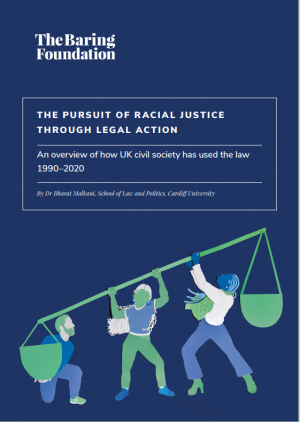The Racial Justice Network (RJN) is an anti-racist charity based in West Yorkshire. RJN brings together groups, organisations and individuals from across the West Yorkshire region (and beyond) to proactively promote racial justice and address colonial legacies. Our organisation aims to raise awareness about, and mobilise around, racial inequality and injustice by listening and working with disempowered communities, taking positive action for justice and solidarity.
Yorkshire Resists is a network of organisations and individuals working to resist the Hostile Environment across Yorkshire. Together we launched the #StopTheSCANdal campaign to fight against the implementation of biometric fingerprint scanners introduced to police forces across England and Wales.
Mobile fingerprinting devices allow officers to scan, on the spot, a person’s fingerprint against the IDENT1 criminal record database and the Home Office IABS (Immigration and Asylum Biometric Service) database, without taking the individual into custody, through a portal called the Biometric Services Gateway. A match may result in an arrest, contact with the Home Office or even detention.
“A match may result in an arrest, contact with the Home Office or even detention.”
Stark figures from our latest round of Freedom of Information requests reveal the extent of the racial bias in the use of these devices. Furthermore, by allowing real-time immigration checks to be carried out on street corners, roadsides, and other public spaces, these devices further marginalise communities already traumatised by the hostile environment policy.
The Racial Justice Network received a grant from the Baring Foundation to take legal action addressing the impacts of these devices on human rights and privacy rights. Here is an update on the journey so far from Carys, a campaign and litigation support worker for Stop the Scan, with support from the team.
_________________________________________________________________________
Why is action so urgent and important? As Laura – Trustee at RJN and one of the report’s authors – comments below, the technology poses a significant, and all too familiar, danger:
“Since the pilot of this technology, we have tried to warn the public of the dangerous and harmful implications it will have on all of us. Three years on, we have now seen the extension of this technology to mobile facial recognition software. Where does it stop? We must continue to oppose the surveillance and criminalisation of those that have been othered by the system: racially minoritised communities, migrants, lower income communities, Roma, Gypsy and Traveller communities, among others. Today they come for us and our communities but what is to stop them from coming after you and your loved ones tomorrow?
We are living in a historical moment in time, where more and more people are pushing back against an unjust and unequal system through direct action, protests and community-led projects. This has come with a backlash of increased powers given to the state and police to disrupt this mobilization. The use of biometric fingerprint scanners and mobile facial recognition software is the latest attempt to halt our organising. We must continue to agitate and confront the use of this technology. Our freedom is bound to each other.”
Over the past five years, we have pursued action on a range of fronts. As a grassroots-led initiative, we have engaged, supported and advocated alongside targeted communities. Where necessary, we have lobbied decision-makers to end the devices’ use on the grounds of discrimination, opaque ethical review processes and absence of substantive community consultation. We have conducted extensive research including three rounds of FOI analyses, as well public opinion surveys where people shared with us the isolating impact of the technology.
In October 2022, we launched a report on the latest FOI data, which revealed that:
- 24 police forces, that we know of, are currently using the mobile fingerprinting app.
- Black people are 4 times more likely to be scanned than a white person.
- Asian people are 2 times more likely to be scanned than a white person.
In the context of endemic institutional racism, it is alarming that a number of forces either did not collect, or refused to provide, these statistics. The report also discusses the new Operator Initiated Facial Recognition app and its use on minors. To find out about more of our key findings, please download our report and share with your networks.
We published our findings not only to form the basis of a judicial review, but also to raise awareness on a technology that continues to creep under the public radar. We want to encourage those who can do something to use their voice in protest.
As the New Year begins, people look ahead to differences they can make to the way they live and the world they live in. This January, we invite you to join us in our renewed commitment to eliminating racial injustice. Help us by writing to your MP to let them know that this technology has no place in our communities.
Download the PDF report here.
Write to your MP here.
Retweet here.
Read a blog Post here and watch a short video on key points here
The Racial Justice Network was awarded a grant in 2021 as part of the Baring Foundation’s funding to support legal action against racial injustice in the criminal justice system.
